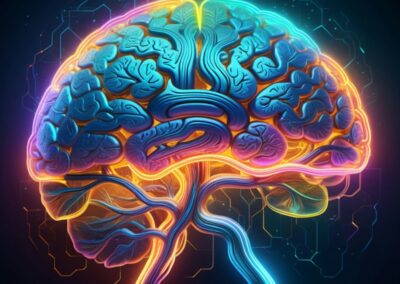Revolutionizing Mental Health with Artificial Intelligence
The Emergence of AI in Mental Health Interventions
Artificial Intelligence (AI) is rapidly transforming various sectors. A particularly promising area is the application of AI in cognitive therapies for mental health. AI-driven tools and platforms are revolutionizing how mental health conditions are diagnosed, monitored, and treated, offering new hope for millions of individuals worldwide. In regions like Saudi Arabia and the UAE, where mental health awareness is steadily rising, the integration of AI into cognitive therapies is set to make a significant impact.
AI in cognitive therapies leverages machine learning algorithms to analyze vast amounts of data, identify patterns, and provide personalized treatment plans. These AI systems can process data from various sources, such as electronic health records, wearable devices, and even social media interactions, to gain insights into an individual’s mental health status. By doing so, AI not only enhances the precision of diagnoses but also tailors interventions to meet the unique needs of each patient.
In cities like Riyadh and Dubai, where technological advancements are prioritized, the adoption of AI in mental health care aligns with broader national strategies to enhance healthcare services. For business executives, mid-level managers, and entrepreneurs, understanding the potential of AI in cognitive therapies can open new avenues for investment and innovation in the health sector.
AI-Powered Diagnostic Tools and Personalized Interventions
AI-powered diagnostic tools are at the forefront of transforming mental health care. These tools utilize sophisticated algorithms to detect early signs of mental health conditions such as depression, anxiety, and PTSD. By analyzing speech patterns, facial expressions, and behavioral data, AI can provide accurate and timely diagnoses, enabling early intervention and better outcomes.
For instance, in the UAE, AI-driven mental health platforms are being developed to offer round-the-clock support and monitoring. These platforms use natural language processing (NLP) to understand and respond to user inputs, providing immediate assistance and coping strategies. By continuously learning from user interactions, AI systems can adapt and improve their responses, ensuring that individuals receive the most relevant and effective support.
Moreover, AI in cognitive therapies extends to personalized treatment plans. Machine learning algorithms analyze data from various therapeutic sessions to determine the most effective interventions for each patient. This personalized approach ensures that therapies are tailored to the individual’s specific needs, increasing the likelihood of successful outcomes. In Saudi Arabia, integrating AI into mental health services can enhance the overall quality of care, making it more accessible and effective for the population.
The Role of AI in Enhancing Therapist Efficiency
AI is also playing a pivotal role in augmenting the capabilities of mental health professionals. By automating routine tasks such as data entry and patient monitoring, AI allows therapists to focus more on direct patient care. This increased efficiency can lead to better patient outcomes and higher job satisfaction for therapists.
In Dubai, mental health facilities are increasingly incorporating AI tools to streamline their operations. AI-powered systems can manage appointment schedules, track patient progress, and even suggest adjustments to treatment plans based on real-time data analysis. These capabilities not only improve the efficiency of mental health services but also enhance the accuracy and effectiveness of treatments.
Furthermore, AI can assist therapists in identifying potential risk factors and warning signs that may be overlooked in traditional settings. For example, AI algorithms can analyze patient data to detect patterns indicative of worsening mental health conditions, prompting timely interventions. In Riyadh, implementing such AI-driven systems can significantly improve the proactive management of mental health, reducing the incidence of severe mental health crises.
Future Directions and Challenges in AI-Driven Mental Health Care
Innovations and Future Trends in AI Cognitive Therapies
The future of AI in cognitive therapies for mental health looks promising, with continuous advancements in technology and increasing acceptance in the healthcare sector. One emerging trend is the integration of virtual reality (VR) with AI to create immersive therapeutic environments. These VR-based therapies can simulate real-life scenarios, helping individuals develop coping strategies in a controlled and safe environment.
In the UAE, research is underway to combine AI with VR to treat conditions such as phobias, PTSD, and social anxiety. By creating realistic and interactive scenarios, these therapies can provide effective exposure therapy, reducing symptoms and improving overall mental health. Additionally, AI-powered chatbots and virtual therapists are becoming more sophisticated, offering 24/7 support and bridging the gap in mental health care accessibility.
In Saudi Arabia, investments in AI research and development are driving innovations in mental health care. Collaborations between healthcare providers, technology companies, and academic institutions are fostering the creation of cutting-edge AI-driven therapies. These initiatives are not only enhancing the quality of mental health care but also positioning the region as a leader in healthcare innovation.
Addressing Ethical and Practical Challenges
Despite the numerous benefits, integrating AI into cognitive therapies for mental health also presents challenges that need to be addressed. One significant concern is data privacy and security. AI systems rely on vast amounts of personal and sensitive data, making it crucial to implement robust data protection measures. Ensuring that patient data is securely stored and used ethically is paramount to maintaining trust in AI-driven mental health services.
In Dubai, regulations are being developed to safeguard patient data and ensure ethical use of AI in healthcare. These regulations aim to balance the benefits of AI with the need to protect individual privacy and autonomy. Similarly, in Riyadh, initiatives are underway to create a regulatory framework that supports the safe and ethical use of AI in mental health care.
Another challenge is the potential for AI to perpetuate existing biases in mental health diagnoses and treatments. AI systems are only as good as the data they are trained on, and if this data is biased, the resulting AI models can also be biased. Addressing this issue requires careful consideration of the data used to train AI systems and ongoing efforts to ensure fairness and equity in AI-driven mental health care.
Conclusion: The Transformative Potential of AI in Mental Health
AI-powered cognitive therapies have the potential to revolutionize mental health care, offering personalized, efficient, and effective interventions for individuals with mental health conditions. By leveraging the power of AI, healthcare providers can enhance diagnostic accuracy, tailor treatments to individual needs, and improve overall patient outcomes.
In regions like Saudi Arabia and the UAE, the adoption of AI in mental health care aligns with broader national strategies to advance healthcare services and promote technological innovation. By addressing challenges related to data privacy and bias, and by investing in research and development, these nations can lead the way in integrating AI into mental health care.
As we look to the future, it is essential to continue exploring new applications of AI in cognitive therapies and to remain committed to ethical and equitable practices. By doing so, we can ensure that the benefits of AI-powered mental health care are accessible to all, paving the way for a healthier and more resilient society.
#AIMentalHealth #CognitiveTherapies #ArtificialIntelligence #SaudiArabia #UAE #Riyadh #Dubai #ModernTechnology #BusinessSuccess #Leadership #ProjectManagement































